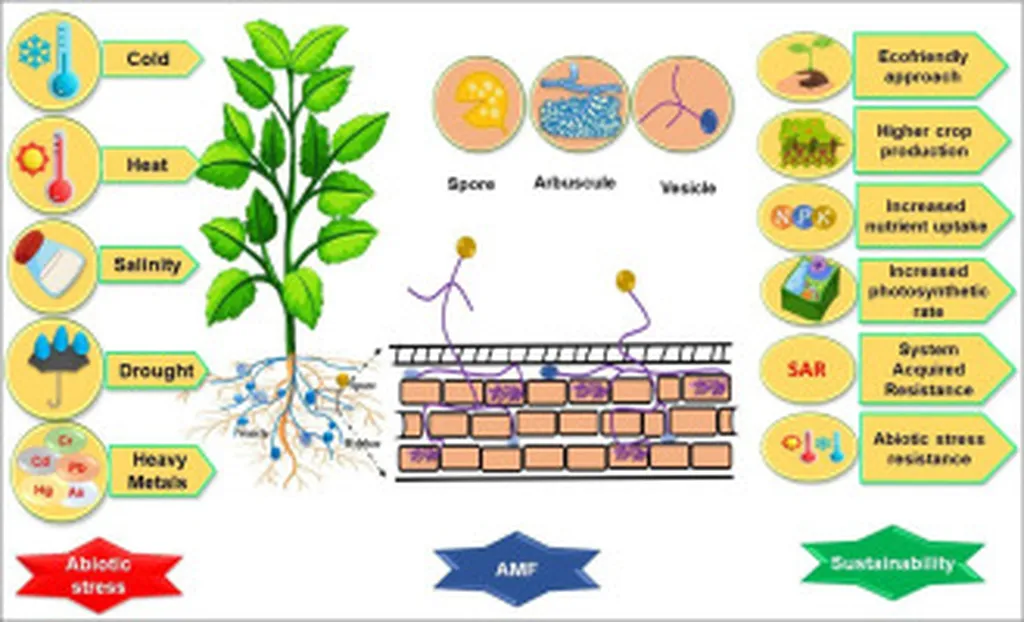In the quest for sustainable agriculture, scientists are turning to an unlikely ally: fungi. A recent review published in the journal *Frontiers in Plant Science* (English translation of *Frontiers in Microbiology*) highlights the pivotal role of arbuscular mycorrhizal fungi (AMF) in enhancing plant growth and disease resistance, offering a promising avenue for sustainable crop production. Led by Muhammad Umer from the School of Breeding and Multiplication at Hainan University in China, the research delves into the intricate symbiotic relationships between AMF and plants, revealing their potential to revolutionize agriculture.
AMF, ubiquitous in terrestrial ecosystems, form symbiotic relationships with plant roots, creating extensive hyphal networks that significantly boost nutrient and water uptake. “AMF improves host plant performance through enhanced phosphorus, nitrogen, and water uptake,” Umer explains. This symbiotic relationship not only bolsters plant growth but also fortifies plants against a myriad of biotic and abiotic stresses.
The review underscores the multifaceted benefits of AMF colonization. By modulating phytohormonal signaling pathways, AMF primes plants for defense, upregulating defense-related gene expression and enhancing the biosynthesis of secondary metabolites. “Increased biosynthesis of secondary metabolites, reinforcement of cell walls, and activation of antioxidant enzyme systems often accompany these responses,” Umer notes. This heightened resistance is crucial in combating soil-borne pathogens, including fungi, bacteria, and nematodes.
Moreover, AMF engage in synergistic interactions with other beneficial rhizosphere microbiota, such as Trichoderma, Pseudomonas, and Bacillus, amplifying their collective biocontrol efficacy. Through the modulation of root exudates and glomalin-mediated soil aggregation, AMF contribute to the establishment of disease-suppressive soils, fostering a healthier ecosystem for plant growth.
The implications for sustainable agriculture are profound. As the world grapples with the challenges of climate change and food security, AMF offer a sustainable and eco-friendly solution. By enhancing nutrient uptake and disease resistance, AMF can reduce the reliance on chemical fertilizers and pesticides, promoting more sustainable farming practices.
Genomic and transcriptomic studies have further elucidated the common symbiosis-signaling pathway, supporting AMF-host specificity and functional outcomes. This deeper understanding paves the way for targeted research on strain-host-environment interactions, formulation technologies, and long-term ecosystem impacts.
As we look to the future, the integration of AMF into agricultural practices holds immense promise. “AMF is a promising biotechnological tool for integrated pest, disease, and nutrient management,” Umer asserts. By advancing their application in field settings, we can align AMF-based strategies with the goals of resilient and sustainable agriculture, ensuring a healthier and more productive future for our crops and ecosystems.
This research not only sheds light on the intricate symbiotic relationships between AMF and plants but also opens new avenues for sustainable agriculture. As we continue to explore and harness the power of these microscopic allies, we move closer to a future where agriculture is not just productive but also sustainable and resilient.

